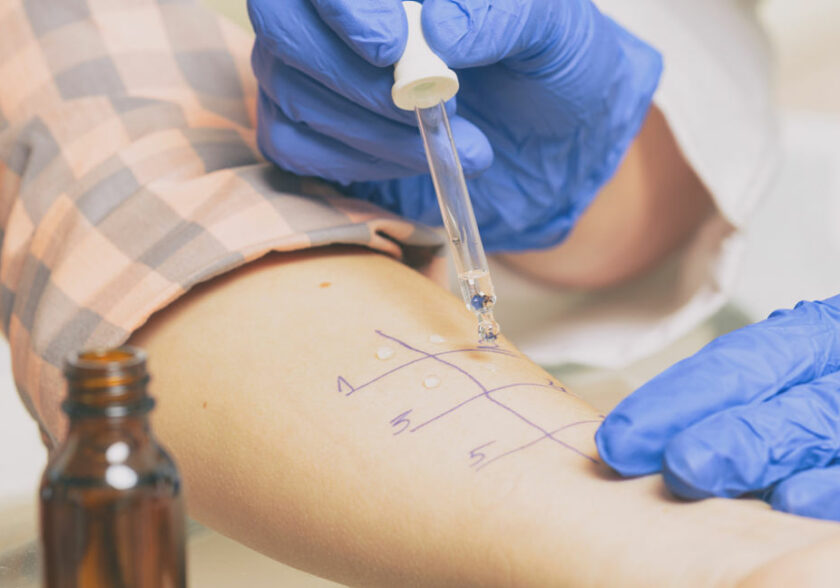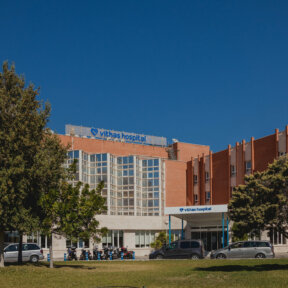What is allergology?
Allergology is the study of hypersensitivity reactions. Hypersensitivity is defined as an excessive or inadequate response by the body’s defensive (immune) system to contact with certain harmless substances (such as pollen, mites, food, medicines) that other people can tolerate normally.
Allergic individuals (people who have a genetic predisposition for atopy) produce sensitised lymphocytes that promote the production of elevated levels of allergic substance-specific IgE antibodies.
When bound to the allergic substance (allergen), IgE antibodies activate mast cells that release substances (mediators) that produce an allergic reaction.
What does allergology study?
Allergology studies which allergens trigger these specific IgE antibodies and whether they’re capable of developing an allergic response. To diagnose this, allergy skin tests are used with various techniques. Depending on the allergen’s pathway or entry route into the body, we may use a prick test to study respiratory and food allergens (oral); intradermal tests for medicines and hymenoptera venom (bee and wasp stings) and epicutaneous tests for substances that come into contact with the skin causing dermatitis. Other times, the reaction mechanisms may not be mediated by IgE and the study is done by exposing you to the allergen and determining whether there is a clinical reaction (also called a challenge test).
What does it diagnose?
The first step is to identify which allergic disease has occurred. In the case of respiratory allergens, we assess whether it manifests itself as rhinitis, sinusitis, conjunctivitis or asthma; when food is involved, we study the presence of anaphylaxis, digestive symptoms, and alterations of the intestinal rhythm; for drugs, we assess the presence of urticaria, angioedema, digestive, respiratory or anaphylaxis problems, the same with hymenoptera stings. The occupational allergy study may be accompanied by asthma, rhinitis, or dermatitis exacerbated by substances found at work.
Once the clinical manifestations have been assessed, we try to find what’s causing your allergy. To do this, we perform allergy studies to determine which allergens could be involved and responsible for the clinical picture.
What does it treat?
Treatment focuses on avoiding allergens that cause the disease. When a specific treatment for the allergic disease is available, such as specific vaccines or biological drugs, this will be prescribed to change the natural history of the disease, slow its development and allow you to return to normal.
Which patients is it for?
The Allergology Service is for patients in whom an external trigger has been found to cause their symptoms, either by the repeated intake of a specific food or drug, or by the presence of seasonal symptoms, or symptoms brought about by wind, humidity, work or in a specific physical space.
Main conditions and diseases
- Seasonal or persistent rhinitis
- Seasonal conjunctivitis
- Seasonal, perennial or severe asthma
- Rhinitis and/or occupational asthma
- Rhinosinusitis
- Drug reactions, including to anaesthetics
- Allergic reactions to food
- Fructose or lactose intolerance
- Hymenoptera sting (wasps and bees) allergies
- Urticaria/angioedema
- Hereditary angioedema
- Atopic dermatitis
- Contact dermatitis
Main diagnostic resources and technology
- Allergic skin tests using prick tests and intradermal reaction
- Epicutaneous tests
- Functional respiratory examination
- Bronchial, nasal or conjunctival provocation tests
- Drug provocation test
- Food provocation test
- Administration of high-risk immunotherapy with hymenoptera venom and food
- Administration of specific immunotherapy against respiratory allergens
Main treatments
- Asthma and rhinitis treatment
- Chronic spontaneous urticaria treatment
- Treatment with immunotherapy against respiratory diseases
- Treatment with hymenoptera venom
- Treatment with immunotherapy against food
- Treatment with immunotherapy against respiratory allergens (mites, animal epithelia, aerogenic fungi and pollens)
Areas of specialisation
- Paediatric department: study and treatment of respiratory diseases in children and food allergy
- Drug and food reactions: diagnosis and alternative recommendations
- Respiratory and occupational skin diseases
- Chronic urticaria and hereditary angioedema
Special services
Our allergy service is a leading centre in the study of reactions to food and medicines, as well as in the study of occupational asthma.
Our Allergology Clinic serves patients from paediatric age to adults, carrying out diagnosis and treatment for all types of allergic pathologies with a highly qualified team of professionals.
Why come to our clinic?
- Extensive experience in monitoring allergic patients
- Use of methodology for the different allergic causes that can lead to a disease (food, medicines, contact substances, inhalation of allergens)
- Team with experience in performing complementary allergic tests
FAQs
Can the allergy tests be performed on the same day of the consultation?
Allergy tests for environmental allergens and food can be done on the same day if you have stopped taking antihistamines and oral corticosteroids at least 5 days before the consultation.
Can a drug study be done at a clinic?
For drug studies, the test will be initiated at the beginning of the consultation and you must remain under observation for 4 hours. You should also stop taking antihistamines and corticosteroids 5 days prior to the study. Only one drug can be studied per week.
How are epicutaneous or patch tests performed?
A battery of patches will be applied to your back, which should remain in place for two days without getting them wet. They are applied at the beginning of the week to observe your response throughout the week. You should also stop taking antihistamines and corticosteroids at least 7 days prior to the test.
What should I bring to the consultation?
Bring any previous reports if you have had a previous allergy study as well as treatments you’ve had done, and information about the current medication you are taking.














